- Home
- Henry James
Henry James Page 10
Henry James Read online
Page 10
These are glimmering ghosts, though that drama of the scene hard by at which I have glanced gives me back its agents with a finer intensity. For the long action set in, as I have hinted, with the death of Aunt Wyckoff, and, if rather taking its time at first to develop, maintained to the end, which was in its full finality but a few years since, the finest consistency and unity; with cousin Helen, in rich prominence, for the heroine; with the pale adventurous Albert for the hero or young protagonist, a little indeed in the sense of a small New York Orestes ridden by Furies; with a pair of confidants in the form first of the heroine’s highly respectable but quite negligible husband and, second, of her close friend and quasi-sister our own admirable Aunt; with Alexander’s younger brother, above all, the odd, the eccentric, the attaching Henry, for the stake, as it were, of the game. So for the spectator did the figures distribute themselves; the three principal, on the large stage—it became a field of such spreading interests—well in front, and the accessory pair, all sympathy and zeal, prompt comment and rich resonance, hovering in the background, responsive to any call and on the spot at a sign: this most particularly true indeed of our anything but detached Aunt, much less a passive recipient than a vessel constantly brimming, and destined herself to become the outstanding agent, almost the dea ex machina, in the last act of the story. Her colleague of the earlier periods (though to that title she would scarce have granted his right) I designate rather as our earnest cousin’s husband than as our kinsman even by courtesy; since he was “Mr.” to his own wife, for whom the dread of liberties taken in general included even those that might have been allowed to herself: he had not in the least, like the others in his case, married into the cousinship with us, and this apparently rather by his defect than by ours. His christian name, if certainly not for use, was scarce even for ornament—which consorted with the felt limits roundabout him of aids to mention and with the fact that no man could on his journey through life well have been less eagerly designated or apostrophised. If there are persons as to whom the “Mr.” never comes up at all, so there are those as to whom it never subsides; but some of them all keep it by the greatness and others, oddly enough, by the smallness of their importance. The subject of my present reference, as I think of him, nevertheless—by which I mean in spite of his place in the latter group—greatly helps my documentation; he must have been of so excellent and consistent a shade of nullity. To that value, if value it be, there almost always attaches some question of the degree and the position: with adjuncts, with a relation, the zero may figure as a numeral—and the neglected zero is mostly, for that matter, endowed with a consciousness and subject to irritation. For this dim little gentleman, so perfectly a gentleman, no appeal and no redress, from the beginning to the end of his career, were made or entertained or projected; no question of how to treat him, or of how he might see it or feel it, could ever possibly rise; he was blank from whatever view, remaining so under application of whatever acid or exposure to whatever heat; the one identity he could have was to be part of the consensus.
Such a case is rare—that of being no case at all, that of not having even the interest of the grievance of not being one: we as a rule catch glimpses in the down-trodden of such resentments—they have at least sometimes the importance of feeling the weight of our tread. The phenomenon was here quite other—that of a natural platitude that had never risen to the level of sensibility. When you have been wronged you can be righted, when you have suffered you can be soothed; if you have that amount of grasp of the “scene,” however humble, the drama of your life to some extent enacts itself, with the logical consequence of your being proportionately its hero and having to be taken for such. Let me not dream of attempting to say for what cousin Helen took her spectral spouse, though I think it the most marked touch in her portrait that she kept us from ever knowing. She was a person about whom you knew everything else, but there she was genially inscrutable, and above all claimed no damages on the score of slights offered him. She knew nothing whatever of these, yet could herself be much wounded or hurt—which latter word she sounded in the wondrous old New York manner so irreducible to notation. She covered the whole case with a mantle which was yet much more probably that of her real simplicity than of a feigned unconsciousness; I doubt whether she knew that men could be amiable in a different manner from that which had to serve her for supposing her husband amiable; when the mould and the men cast in it were very different she failed, or at least she feared, to conclude to amiability—though some women (as different themselves as such stranger men!) might take it for that. Directly interrogated she might (such was the innocence of these long-extinct manners) have approved of male society in stronger doses or more vivid hues—save where consanguinity, or indeed relationship by marriage, to which she greatly deferred, had honestly imposed it. The singular thing for the drama to which I return was that there it was just consanguinity that had made the burden difficult and strange and of a nature to call on great decisions and patient plans, even though the most ominous possibilities were not involved. I reconstruct and reconstruct of course, but the elements had to my childish vision at least nothing at all portentous; if any light of the lurid played in for me just a little it was but under much later information. What my childish vision was really most possessed of, I think, was the figure of the spectral spouse, the dim little gentleman, as I have called him, pacing the whole length of the two big parlours, in prolonged repetition, much as if they had been the deck of one of those ships anciently haunted by him, as “supercargo” or whatever, in strange far seas—according to the only legend connected with him save that of his early presumption in having approached, such as he was, so fine a young woman, and his remarkable luck in having approached her successfully; a luck surprisingly renewed for him, since it was also part of the legend that he had previously married and lost a bride beyond his deserts.
XI
I AM, strictly speaking, at this point, on a visit to Albert, who at times sociably condescended to my fewer years—I still appreciate the man-of-the-world ease of it; but my host seems for the minute to have left me, and I am attached but to the rich perspective in which “Uncle” (for Albert too he was only all namelessly Uncle) comes and goes; out of the comparative high brownness of the back room, commanding brave extensions, as I thought them, a covered piazza over which, in season, Isabella grapes accessibly clustered and beyond which stretched, further, a “yard” that was as an ample garden compared to ours at home; I keep in view his little rounded back, at the base of which his arms are interlocked behind him, and I know how his bald head, yet with the hair bristling up almost in short-horn fashion at the sides, is thrust inquiringly, not to say appealingly, forward; I assist at his emergence, where the fine old mahogany doors of separation are rolled back on what used to seem to me silver wheels, into the brighter yet colder half of the scene, and attend him while he at last looks out awhile into Fourteenth Street for news of whatever may be remarkably, objectionably or mercifully taking place there; and then I await his regular return, preparatory to a renewed advance, far from indifferent as I innocently am to his discoveries or his comments. It is cousin Helen however who preferentially takes them up, attaching to them the right importance, which is for the moment the very greatest that could possibly be attached to anything in the world; I for my part occupied with those marks of character in our pacing companion—his long, slightly equine countenance, his eyebrows ever elevated as in the curiosity of alarm, and the so limited play from side to side of his extremely protrusive head, as if somehow through tightness of the “wash” neckcloths that he habitually wore and that, wound and re-wound in their successive stages, made his neck very long without making it in the least thick and reached their climax in a proportionately very small knot tied with the neatest art. I scarce can have known at the time that this was as complete a little old-world figure as any that might then have been noted there, far or near; yet if I didn’t somehow “subtly” feel it, why am I now so conv
inced that I must have had familiarly before me a masterpiece of the great Daumier, say, or Henri Monnier, or any other then contemporary projector of Monsieur Prudhomme, the timorous Philistine in a world of dangers, with whom I was later on to make acquaintance? I put myself the question, of scant importance though it may seem; but there is a reflection perhaps more timely than any answer to it. I catch myself in the act of seeing poor anonymous “Dear,” as cousin Helen confined herself, her life long, to calling him, in the light of an image arrested by the French genius, and this in truth opens up vistas. I scarce know what it doesn’t suggest for the fact of sharpness, of intensity of type; which fact in turn leads my imagination almost any dance, making me ask myself quite most of all whether a person so marked by it mustn’t really have been a highly finished figure.
That degree of finish was surely rare among us—rare at a time when the charm of so much of the cousinship and the uncleship, the kinship generally, had to be found in their so engagingly dispensing with any finish at all. They happened to be amiable, to be delightful; but—I think I have already put the question—what would have become of us all if they hadn’t been? a question the shudder of which could never have been suggested by the presence I am considering. He too was gentle and bland, as it happened—and I indeed see it all as a world quite unfavourable to arrogance or insolence or any hard and high assumption; but the more I think of him (even at the risk of thinking too much) the more I make out in him a tone and a manner that deprecated crude ease. Plenty of this was already in the air, but if he hadn’t so spoken of an order in which forms still counted it might scarce have occurred to one that there had ever been any. It comes over me therefore that he testified—and perhaps quite beautifully; I remember his voice and his speech, which were not those of that New York at all, and with the echo, faint as it is, arrives the wonder of where he could possibly have picked such things up. They were, as forms, adjusted and settled things; from what finer civilisation therefore had they come down to him? To brood on this the least little bit is verily, as I have said, to open up vistas—out of the depths of one of which fairly glimmers the queerest of questions. Mayn’t we accordingly have been, the rest of us, all wrong, and the dim little gentleman the only one among us who was right? May not his truth to type have been a matter that, as mostly typeless ourselves, we neither perceived nor appreciated?—so that if, as is conceivable, he felt and measured the situation and simply chose to be bland and quiet and keep his sense to himself, he was a hero without the laurel as well as a martyr without the crown. The light of which possibility is, however, too fierce; I turn it off, I tear myself from the view—noting further but the one fact in his history that, by my glimpse of it, quite escapes ambiguity. The youthful Albert, I have mentioned, was to resist successfully through those years that solicitation of “Europe” our own response to which, both as a general and a particular solution, kept breaking out in choral wails; but the other house none the less nourished projects so earnest that they could invoke the dignity of comparative silence and patience. The other house didn’t aspire to the tongues, but it aspired to the grand tour, of which ours was on many grounds incapable. Only after years and when endless things had happened—Albert having long before, in especial, quite taken up his stake and ostensibly dropped out of the game—did the great adventure get itself enacted, with the effect of one of the liveliest illustrations of the irony of fate. What had most of all flushed through the dream of it during years was the legend, at last quite antediluvian, of the dim little gentleman’s early Wanderjahre, that experience of distant lands and seas which would find an application none the less lively for having had long to wait. It had had to wait in truth half a century, yet its confidence had apparently not been impaired when New York, on the happy day, began to recede from view. Europe had surprises, none the less, and who knows to what extent it may after half a century have had shocks? The coming true of the old dream produced at any rate a snap of the tense cord, and the ancient worthy my imagination has, in the tenderest of intentions, thus played with, disembarked in England only to indulge in the last of his startled stares, only to look about him in vague deprecation and give it all up. He just landed and died; but the grand tour was none the less proceeded with—cousin Helen herself, aided by resources personal, social and financial that left nothing to desire, triumphantly performed it, though as with a feeling of delicacy about it firmly overcome.
But it has taken me quite out of the other house, so that I patch up again, at a stroke, that early scene of her double guardianship at which my small wonder assisted. It even then glimmered on me, I think, that if Albert was, all so romantically, in charge of his aunt—which was a perfectly nondescript relation—so his uncle Henry, her odd brother, was her more or less legal ward, not less, despite his being so very much Albert’s senior. In these facts and in the character of each of the three persons involved resided the drama; which must more or less have begun, as I have hinted, when simple-minded Henry, at a date I seem to have seized, definitely emerged from rustication—the Beaverkill had but for a certain term protected, or promoted, his simplicity—and began, on his side, to pace the well-worn field between the Fourteenth Street windows and the piazza of the Isabella grapes. I see him there less vividly than his fellow-pedestrian only because he was afterwards to loom so much larger, whereas his companion, even while still present, was weakly to shrink and fade. At this late day only do I devise for that companion a possible history; the simple-minded Henry’s annals on the other hand grew in interest as soon as they became interesting at all. This happened as soon as one took in the ground and some of the features of his tutelage. The basis of it all was that, harmless as he appeared, he was not to be trusted; I remember how portentous that truth soon looked, both in the light of his intense amiability and of sister Helen’s absolute certitude. He wasn’t to be trusted—it was the sole very definite fact about him except the fact that he had so kindly come down from the far-off Beaverkill to regale us with the perfect demonstration, dutifully, resignedly setting himself among us to point the whole moral himself. He appeared, from the moment we really took it in, to be doing, in the matter, no more than he ought; he exposed himself to our invidious gaze, on this ground, with a humility, a quiet courtesy and an instinctive dignity that come back to me as simply heroic. He had himself accepted, under strenuous suggestion, the dreadful view, and I see him to-day, in the light of the grand dénouement, deferred for long years, but fairly dazzling when it came, as fairly sublime in his decision not to put anyone in the wrong about him a day sooner than he could possibly help. The whole circle of us would in that event be so dreadfully “sold,” as to our wisdom and justice, he proving only noble and exquisite. It didn’t so immensely matter to him as that, the establishment of his true character didn’t; so he went on as if for all the years—and they really piled themselves up: his passing for a dangerous idiot, or at least for a slave of his passions from the moment he was allowed the wherewithal in the least to indulge them, was a less evil for him than seeing us rudely corrected. It was in truth an extraordinary situation and would have offered a splendid subject, as we used to say, to the painter of character, the novelist or the dramatist, with the hand to treat it. After I had read David Copperfield an analogy glimmered—it struck me even in the early time: cousin Henry was more or less another Mr. Dick, just as cousin Helen was in her relation to him more or less another Miss Trotwood. There were disparities indeed: Mr. Dick was the harmless lunatic on that lady’s premises, but she admired him and appealed to him; lunatics, in her generous view, might be oracles, and there is no evidence, if I correctly remember, that she kept him low. Our Mr. Dick was suffered to indulge his passions but on ten cents a day, while his fortune, under conscientious, under admirable care—cousin Helen being no less the wise and keen woman of business than the devoted sister—rolled up and became large; likewise Miss Trotwood’s inmate hadn’t at all the perplexed brooding brow, with the troubled fold in it, that represen
ted poor Henry’s only form of criticism of adverse fate. They had alike the large smooth open countenance of those for whom life has been simplified, and if Mr. Dick had had a fortune he would have remained all his days as modestly vague about the figure of it as our relative consented to remain. The latter’s interests were agricultural, while his predecessor’s, as we remember, were mainly historical; each at any rate had in a general way his Miss Trotwood, not to say his sister Helen.

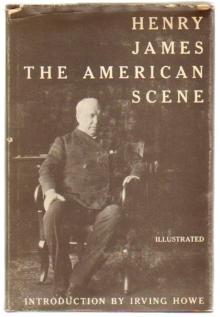 The American
The American The Wings of the Dove, Volume 1 of 2
The Wings of the Dove, Volume 1 of 2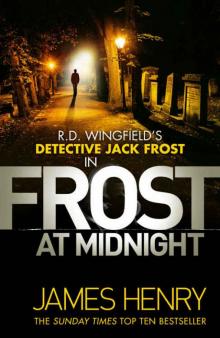 Frost at Midnight
Frost at Midnight Morning Frost
Morning Frost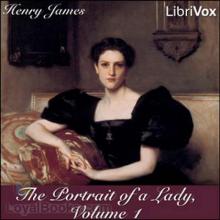 The Portrait of a Lady — Volume 1
The Portrait of a Lady — Volume 1 Fatal Frost
Fatal Frost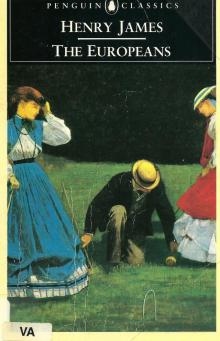 The Europeans
The Europeans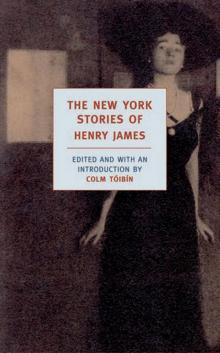 The New York Stories of Henry James
The New York Stories of Henry James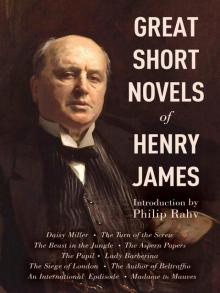 Great Short Novels of Henry James
Great Short Novels of Henry James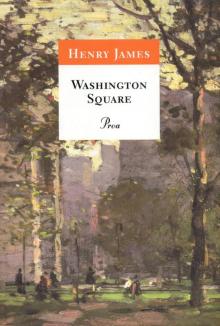 Washington Square
Washington Square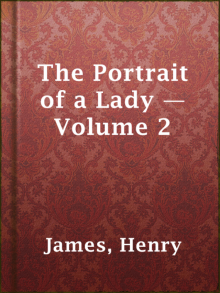 The Portrait of a Lady — Volume 2
The Portrait of a Lady — Volume 2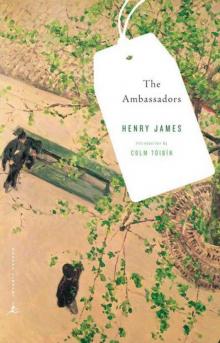 The Ambassadors
The Ambassadors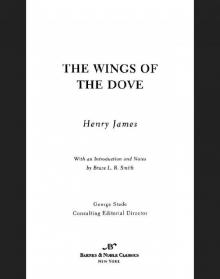 The Wings of the Dove
The Wings of the Dove The Princess Casamassima (Classics)
The Princess Casamassima (Classics)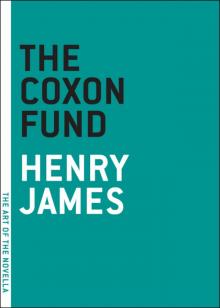 The Coxon Fund
The Coxon Fund First Frost
First Frost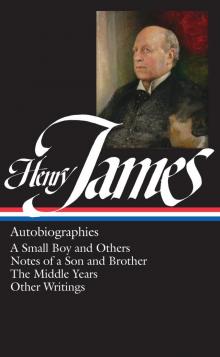 Henry James
Henry James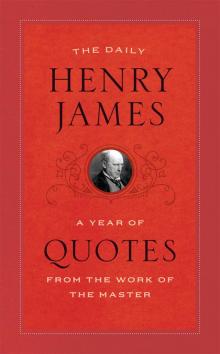 The Daily Henry James
The Daily Henry James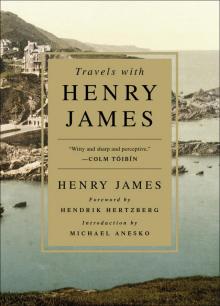 Travels With Henry James
Travels With Henry James The Reverberator: A Novel
The Reverberator: A Novel What Maisie Knew (Henry James Collection)
What Maisie Knew (Henry James Collection)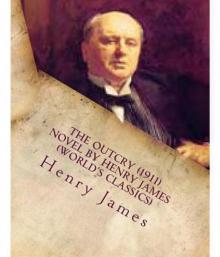 The Outcry
The Outcry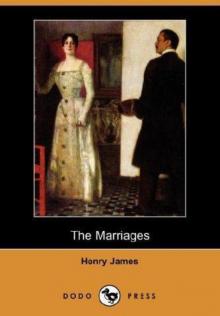 The Marriages
The Marriages The Wings of the Dove, Volume 2
The Wings of the Dove, Volume 2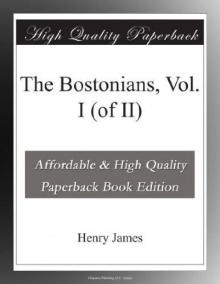 The Bostonians, Vol. I
The Bostonians, Vol. I The Outcry: -1911
The Outcry: -1911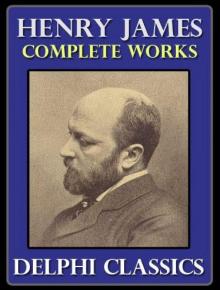 The Complete Works of Henry James
The Complete Works of Henry James Letters from the Palazzo Barbaro
Letters from the Palazzo Barbaro The Pupil
The Pupil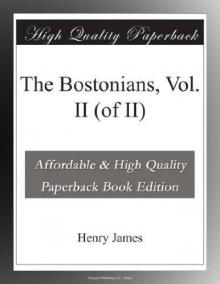 The Bostonians, Vol. II
The Bostonians, Vol. II Pandora
Pandora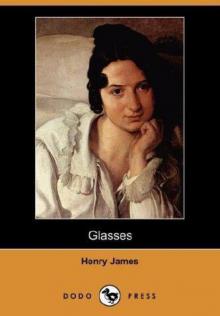 Glasses
Glasses The Princess Casamassima
The Princess Casamassima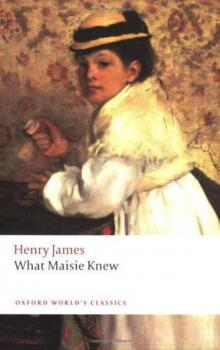 What Maisie Knew
What Maisie Knew The Reverberator
The Reverberator The Golden Bowl - Complete
The Golden Bowl - Complete Confidence
Confidence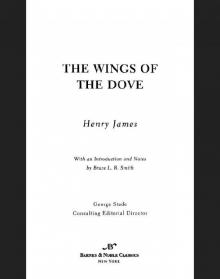 Wings of the Dove (Barnes & Noble Classics Series)
Wings of the Dove (Barnes & Noble Classics Series) The Spoils of Poynton
The Spoils of Poynton